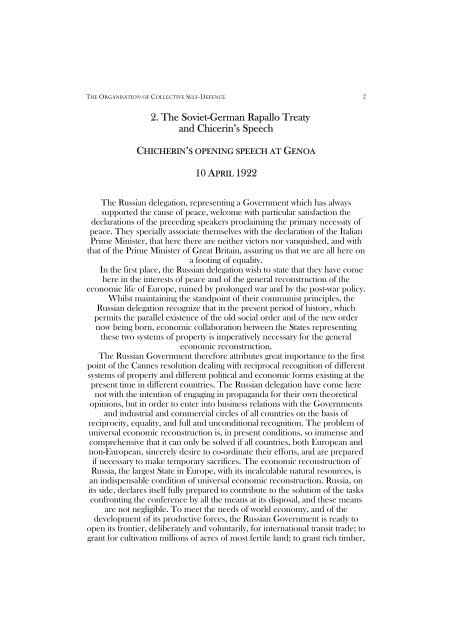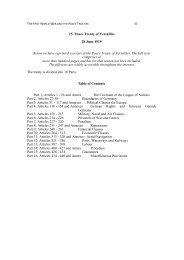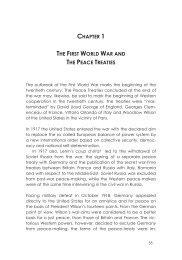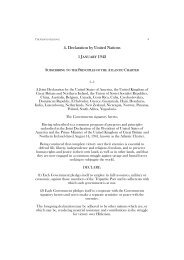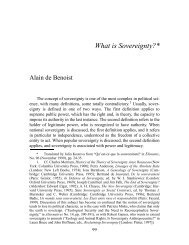2. The Soviet-German Rapallo Treaty and Chicerin's Speech
2. The Soviet-German Rapallo Treaty and Chicerin's Speech
2. The Soviet-German Rapallo Treaty and Chicerin's Speech
Create successful ePaper yourself
Turn your PDF publications into a flip-book with our unique Google optimized e-Paper software.
THE ORGANISATION OF COLLECTIVE SELF-DEFENCE 2<br />
<strong>2.</strong> <strong>The</strong> <strong>Soviet</strong>-<strong>German</strong> <strong>Rapallo</strong> <strong>Treaty</strong><br />
<strong>and</strong> Chicerin’s <strong>Speech</strong><br />
CHICHERIN’S OPENING SPEECH AT GENOA<br />
10 APRIL 1922<br />
<strong>The</strong> Russian delegation, representing a Government which has always<br />
supported the cause of peace, welcome with particular satisfaction the<br />
declarations of the preceding speakers proclaiming the primary necessity of<br />
peace. <strong>The</strong>y specially associate themselves with the declaration of the Italian<br />
Prime Minister, that here there are neither victors nor vanquished, <strong>and</strong> with<br />
that of the Prime Minister of Great Britain, assuring us that we are all here on<br />
a footing of equality.<br />
In the first place, the Russian delegation wish to state that they have come<br />
here in the interests of peace <strong>and</strong> of the general reconstruction of the<br />
economic life of Europe, ruined by prolonged war <strong>and</strong> by the post-war policy.<br />
Whilst maintaining the st<strong>and</strong>point of their communist principles, the<br />
Russian delegation recognize that in the present period of history, which<br />
permits the parallel existence of the old social order <strong>and</strong> of the new order<br />
now being born, economic collaboration between the States representing<br />
these two systems of property is imperatively necessary for the general<br />
economic reconstruction.<br />
<strong>The</strong> Russian Government therefore attributes great importance to the first<br />
point of the Cannes resolution dealing with reciprocal recognition of different<br />
systems of property <strong>and</strong> different political <strong>and</strong> economic forms existing at the<br />
present time in different countries. <strong>The</strong> Russian delegation have come here<br />
not with the intention of engaging in propag<strong>and</strong>a for their own theoretical<br />
opinions, but in order to enter into business relations with the Governments<br />
<strong>and</strong> industrial <strong>and</strong> commercial circles of all countries on the basis of<br />
reciprocity, equality, <strong>and</strong> full <strong>and</strong> unconditional recognition. <strong>The</strong> problem of<br />
universal economic reconstruction is, in present conditions, so immense <strong>and</strong><br />
comprehensive that it can only be solved if all countries, both European <strong>and</strong><br />
non-European, sincerely desire to co-ordinate their efforts, <strong>and</strong> are prepared<br />
if necessary to make temporary sacrifices. <strong>The</strong> economic reconstruction of<br />
Russia, the largest State in Europe, with its incalculable natural resources, is<br />
an indispensable condition of universal economic reconstruction. Russia, on<br />
its side, declares itself fully prepared to contribute to the solution of the tasks<br />
confronting the conference by all the means at its disposal, <strong>and</strong> these means<br />
are not negligible. To meet the needs of world economy, <strong>and</strong> of the<br />
development of its productive forces, the Russian Government is ready to<br />
open its frontier, deliberately <strong>and</strong> voluntarily, for international transit trade; to<br />
grant for cultivation millions of acres of most fertile l<strong>and</strong>; to grant rich timber,
THE ORGANISATION OF COLLECTIVE SELF-DEFENCE 3<br />
coal, <strong>and</strong> mining concessions, particularly in Siberia, <strong>and</strong> a number of other<br />
concessions throughout the territory of the RSFSR. It aims at economic<br />
collaboration between the industry of the West <strong>and</strong> the agriculture <strong>and</strong><br />
industry of Russia <strong>and</strong> Siberia, of such a nature as to enlarge the basis of<br />
European industry, in regard to raw materials, grain, <strong>and</strong> fuel, to a degree far<br />
surpassing the pre-war level. A more detailed draft of a plan of general<br />
economic reconstruction can if necessary, be presented by the Russian<br />
delegation in the course of the conference. That its realization from the<br />
financial <strong>and</strong> economic point of view is perfectly possible is clear from the fact<br />
that the capital which would have to be invested annually for this purpose,<br />
which would guarantee the future of European production, would be equal to<br />
only a small part of the annual expenditure of the countries of Europe <strong>and</strong> of<br />
America on their armies <strong>and</strong> navies.<br />
(...)<br />
TREATY OF RAPALLO<br />
16 APRIL 1922<br />
<strong>The</strong> <strong>German</strong> Government, represented by Reichsminister Dr. Walther<br />
Rathenau, <strong>and</strong> the Government of R.S.F.S.R., represented by People’s<br />
Commissar Chicherin, have agreed upon the following provisions:<br />
I. <strong>The</strong> two Governments agree that all questions resulting from the state of<br />
war between <strong>German</strong>y <strong>and</strong> Russia shall be settled in the following manner:<br />
(a) Both Governments mutually renounce repayment for their war<br />
expenses <strong>and</strong> for damages arising out of the war, that is to say, damages<br />
caused to them <strong>and</strong> their nationals in the zone of war operations by<br />
military measures, including all requisitions effected in a hostile country.<br />
<strong>The</strong>y renounce in the same way repayment for civil damages inflicted on<br />
civilians, that is to say, damages caused to the nationals of the two countries<br />
by exceptional war legislation or by violent measures taken by any<br />
authority of the state of either side.<br />
(b) All legal relations concerning questions of public or private law<br />
resulting from the state of war, including the question of the treatment of<br />
merchant ships which fell into the h<strong>and</strong>s of the one side or the other<br />
during the war, shall be settled on the basis of reciprocity.<br />
(c) <strong>German</strong>y <strong>and</strong> Russia mutually renounce repayment of expenses<br />
incurred for prisoners of war. <strong>The</strong> <strong>German</strong> Government also renounces<br />
repayment of expenses for soldiers of the Red Army interned in <strong>German</strong>y.<br />
<strong>The</strong> Russian Government, for its part, renounces repayment of the sums<br />
<strong>German</strong>y has derived from the sale of Russian Army material brought into<br />
<strong>German</strong>y by these interned troops.
THE ORGANISATION OF COLLECTIVE SELF-DEFENCE 4<br />
II. <strong>German</strong>y renounces all claims resulting from the enforcement of the laws<br />
<strong>and</strong> measures of the <strong>Soviet</strong> Republic as it has affected <strong>German</strong> nationals or<br />
their private rights or the rights of the <strong>German</strong> state itself, as well as claims<br />
resulting from measures taken by the <strong>Soviet</strong> Republic or its authorities in any<br />
other way against subjects of the <strong>German</strong> state or their private rights, provided<br />
that the <strong>Soviet</strong> Republic shall not satisfy similar claims made by any third<br />
state.<br />
III. Consular <strong>and</strong> diplomatic relations between <strong>German</strong>y <strong>and</strong> the Federal<br />
<strong>Soviet</strong> Republic shall be resumed immediately. <strong>The</strong> admission of consuls to<br />
both countries shall be arranged by special agreement.<br />
IV. Both Governments agree, further, that the rights of the nationals of either<br />
of the two Parties on the other’s territory as well as the regulation of<br />
commercial relations shall be based on the most favored nation principle.<br />
This principle does not include rights <strong>and</strong> facilities granted by the <strong>Soviet</strong><br />
Government to another <strong>Soviet</strong> state or to any state that formerly formed part<br />
of the Russian Empire.<br />
V. <strong>The</strong> two Governments undertake to give each other mutual assistance for<br />
the alleviation of their economic difficulties in the most benevolent spirit. In<br />
the event of a general settlement of this question on an international basis,<br />
they undertake to have a preliminary exchange of views. <strong>The</strong> <strong>German</strong><br />
Government declares itself ready to facilitate, as far as possible, the<br />
conclusion <strong>and</strong> the execution of economic contracts between private<br />
enterprises in the two countries.<br />
VI. Article 1, Paragraph (b), <strong>and</strong> Article IV of this Agreement will come into<br />
force after the ratification of this document. <strong>The</strong> other Articles will come into<br />
force immediately.


